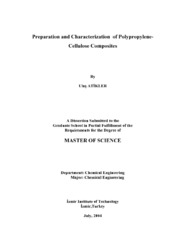Please use this identifier to cite or link to this item:
https://hdl.handle.net/11147/3392| Title: | Preparation and characterization of polypropylene cellulose composites | Authors: | Atikler, Ulaş | Advisors: | Tıhmınlıoğlu, Funda | Publisher: | Izmir Institute of Technology | Abstract: | In recent years, much effort has been driven to replace glass fibers, which were used to reinforce thermoplastic composites, with natural fibers. In this study, three natural fibers, namely cellulose (CE), sawdust (SD) and wheat straw (WS) were employed as reinforcement to polypropylene (PP) polymer matrix. The most important problem encountered with natural fiber/PP composites is the inherent incompatibility between hydrophilic natural fibers and hydrophobic PP matrix, thus coupling agents were employed to alter incompatibility between fiber and matrix. Coupling agents enhance interfacial interactions by chemical and physical bonding between fiber and matrix. Surface treatment of natural fibers were carried out with two kinds of silanes;(3-aminopropyl)-triethoxysilane (AS) and methacriloxy propyl trimethoxy silane (MS), and maleic anhydride grafted polypropylene (MAPP). Silane coupling agents were agitated in aqueous ethanol solution in the presence of fibers at weight percents of 0.5, 1 and 2.5 with respect to fiber weight. MAPP was compounded during melt mixing of fiber and PP at weight percents of 2.5, 5 and 10 with respect to PP weight PP/fiber composites were prepared in a rheomixer equipped with two rotor blades and adjustable temperature, mixing rate and mixing time. Composites were prepared at 185 oC, 50 rpm mixing rate and 10 minutes mixing time. Torque values of each composite formulation were recorded with respect to time to determine changes in rheological properties of composites. It was found that increase in fiber loading increases stabilization torque of composites. Mechanical properties of PP/fiber composites were significantly enhanced byemployment of coupling agents and MAPP was found to be the most effective coupling agent. Mechanical properties of SD composites were found to exhibit the best performance compared to C and WS. Extent of interfacial interactions were evaluated with Pukanszky and Nielsen model and superior performance of MAPP in enhancing interfacial interactions was confirmed by these two models. Optimum conditions for coupling agents were found to be 1 wt % for silane coupling agents and 5 wt % for MAPP. It was found that water sorption and void fraction of the composites decreased with employment of coupling agents. Among the coupling agents, MAPP exhibited the best performance in decreasing water sorption and void fraction of composites confirming results of mechanical tests. Scanning electron micrographs (SEM) used to illustrate the effect of coupling agents on adhesion between fiber and matrix and fracture modes of the composites. In addition, FTIR analysis revealed the decrease in hydrophilicity of fibers with silane treatment and new bond formations with employment of MAPP. | Description: | Thesis (Master)--Izmir Institute of Technology, Chemical Engineering, Izmir, 2004 Includes bibliographical references (leaves: 88) Text in English; Abstract: Turkish and English xv, 92 leaves |
URI: | http://hdl.handle.net/11147/3392 |
| Appears in Collections: | Master Degree / Yüksek Lisans Tezleri |
Files in This Item:
| File | Description | Size | Format | |
|---|---|---|---|---|
| T000507.pdf | MasterThesis | 2.32 MB | Adobe PDF |  View/Open |
CORE Recommender
Page view(s)
230
checked on Nov 18, 2024
Download(s)
132
checked on Nov 18, 2024
Google ScholarTM
Check
Items in GCRIS Repository are protected by copyright, with all rights reserved, unless otherwise indicated.